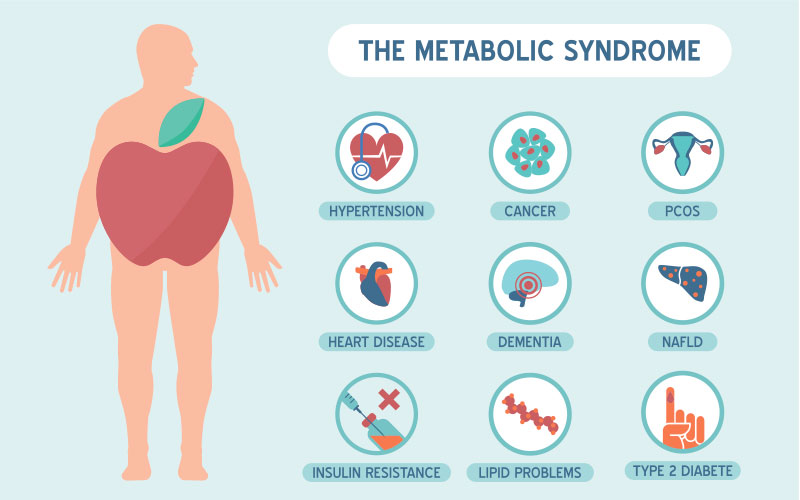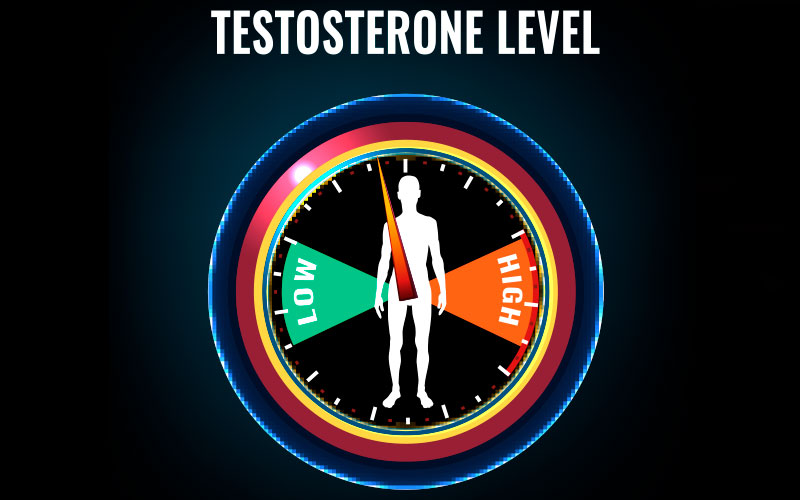- Home
- Growth Hormone
- Growth Hormone
- Growth Hormone Deficiency
- Growth Hormone Therapy
- Growth Hormone Injections
get startedThe Most Effective Hormone Replacement TherapiesLow Testosterone and Metabolic Syndrome
Clinical research has shown that there is a definite link between low testosterone and metabolic syndrome.
Metabolic syndrome is a group of disorders characterized by high blood sugar, high levels of "bad" cholesterol, high blood pressure, and obesity. It puts people at severe risk of death by cardiac arrest or stroke. Medical research has found that people, particularly men with low testosterone, are at a much greater risk of developing metabolic syndrome than men who have more normal testosterone levels.
What Is Metabolic Syndrome?
Metabolic syndrome is on the rise in the United States. Metabolic syndrome is described as a series of medical problems that together increase your risk of heart disease, stroke, and type 2 diabetes.
These conditions include increased blood pressure, high blood sugar, excess body fat around the waist, and abnormal cholesterol or triglyceride levels.
Just because you have one or more of these health issues does not necessarily mean that you have metabolic syndrome. However, doctors agree that having even just one of them increases your chances of developing cardiovascular disease. Having three or more of these factors will warrant a diagnosis of "metabolic syndrome," and it will significantly increase your risk of additional health issues.
Metabolic syndrome is a group of medical problems that together increase your risk of heart disease, stroke, and type 2 diabetes.
What Is the Relationship Between Testosterone and Metabolic Syndrome?
Most of the risk factors for developing metabolic syndrome are related to obesity. Men with low testosterone tend to be overweight. In particular, they have an excess of belly fat. Also, men with low testosterone tend to also have one or more of the conditions associated with metabolic syndrome.
The reverse is also true. Men with diabetes and/or some of the other conditions associated with metabolic syndrome almost always also have low testosterone. This is especially true of men over 45, the very same age group that is most at risk of death from stroke or heart attack.
Can Low Testosterone Increase the Risks of Developing Metabolic Syndrome?
There have been many studies that indicate that low testosterone can predict the development of metabolic syndrome. The most common factor among such patients is obesity – especially abdominal obesity. Experts say that metabolic syndrome is becoming more common because of rising obesity rates. Lack of lean muscle, and a decreased ability to burn fat, are two of the main symptoms of men with low testosterone. Therefore, it stands to reason that low testosterone can and does increase a man’s risk of developing metabolic syndrome.
Diabetes is one of the main conditions associated with metabolic syndrome. According to the Diabetes Association, if you have diabetes, you are twice as likely to also have low testosterone as men without diabetes. Studies have found that men suffering from both diabetes and low-T are also more likely to have high- blood pressure, high cholesterol, and/or one or more of the other conditions associated with metabolic syndrome.
Does Testosterone Replacement Therapy Reduce the Risks of Developing Metabolic Syndrome?
The best treatment for men with low testosterone is testosterone replacement therapy. Testosterone therapy is not prescribed specifically as a treatment for metabolic syndrome. However, since testosterone therapy can reduce or eliminate several of the risk factors that lead to metabolic syndrome, it does lessen your risk of developing metabolic syndrome
Besides reducing your risk of developing metabolic syndrome, there are many positive benefits of testosterone replacement. While research continues into how and why they are linked, we know that testosterone therapy can reduce your risk of developing diabetes and the other conditions associated with metabolic syndrome.
It was once thought that testosterone replacement increased a man’s risk of heart disease. However, since we now know that it can reduce the risk of developing metabolic syndrome, testosterone therapy can actually reduce the risk of death from stroke or heart attack.
In addition to lowering your risk of developing diabetes and metabolic syndrome, testosterone therapy can:
- Reduce belly fat
- Improve your sex drive and sexual performance
- Increase stamina and increase your energy level
- Improve your memory and other cognitive abilities
- Improve your ability to build muscle
- Improve sleep
- Lessen your risk of developing anxiety and depression
If you are a man over 45, and you are tired, depressed, putting on weight, and/or having sexual health issues, and you do not get your testosterone checked, you very well may be putting yourself at a greater risk for metabolic syndrome and heart disease.
There is a link between low testosterone and metabolic syndrome.
What Do the Research Studies Say About Low Testosterone and Metabolic Syndrome?
Clinical research has verified the close link between low testosterone and metabolic syndrome.
For example, a 2010 meta-analysis (study of studies) published in Therapeutic Advances in Endocrinology and Metabolism, concluded “There is convincing evidence that low testosterone is an independent risk factor for development of metabolic syndrome and type 2 diabetes in men. Furthermore, evidence is also accumulating that testosterone deficiency is a cardiovascular risk factor.”This study went on to say that, “There are many recent reviews highlighting the important link between hypogonadism, metabolic syndrome, diabetes, and cardiovascular disease.”
Another study, this one published in 2012 in the Indian Journal of Endocrinology and Metabolism, stated that “Serum testosterone has been shown to be associated with metabolic syndrome, (MetS). Several studies have shown a higher prevalence of MetS in subjects with low testosterone.” The study concluded by saying, “There is a strong evidence of a high prevalence of MetS in patients with a low T level. Many components of MetS are adversely affected in the presence of hypogonadism [low testosterone].”
This study also concluded that testosterone replacement therapy could have a positive effect on reducing a patient’s risk of developing metabolic syndrome, stating, “Early interventional studies have shown that TRT in hypogonadal men with MetS has beneficial effects on central adiposity, insulin resistance, and glycemic control.”
A 2010 research paper published in the medical journal Hypertension Research echoed these conclusions, stating that, “Epidemiological studies have established that low testosterone/low sex hormone-binding globulin can predict the development of the metabolic syndrome.” And that, “There is increasing evidence that testosterone treatment has beneficial effects on visceral fat mobilization and other elements of the metabolic syndrome.”
Evidence suggests that testosterone therapy may reduce your risk of developing metabolic syndrome.
Now that you know a bit more about how low testosterone can increase your risk of developing metabolic syndrome, why not contact us today, and find out more about the many life-changing benefits of testosterone replacement therapy.
- Growth Hormone Therapy



























